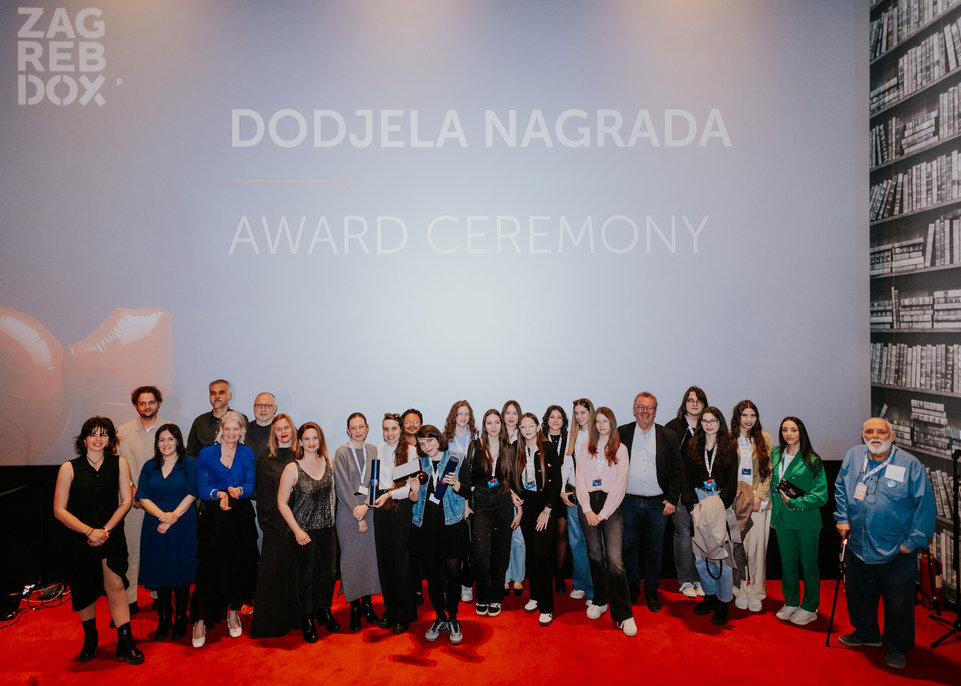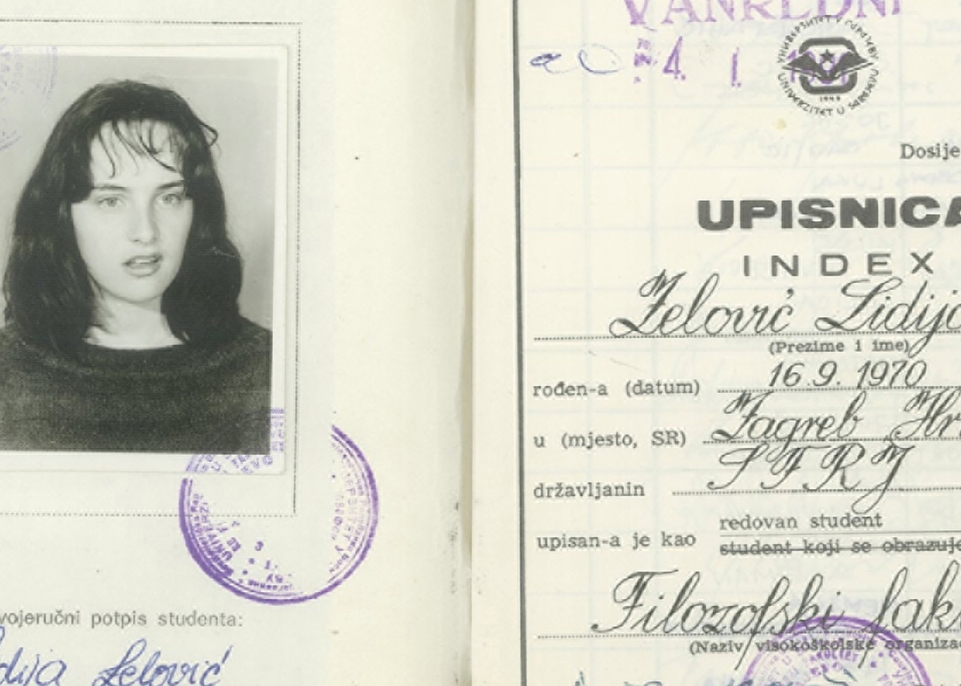


21 st ZagrebDox Awards Presented

6.4.2025.
The Big Stamp went to Mr. Nobody Against Putin by David Borenstein and Pasha Talankin in International Competition and My Dad’s Lessons by Dalija Dozet in Regional Competition. The Little Stamp for best short film went to Arshia Shakiba for Who Loves the Sun.

On Saturday, April 20, starting at 6:15 pm, the winning films of the twenty-first edition of the ZagrebDox International Documentary Film Festival were announced at the awards ceremony. At the festival, which opened last Sunday at the Kaptol Boutique Cinema, the audience had the opportunity to watch as many as 107 documentary works in sixteen sections, and twenty films competed for the official festival award, the Big Stamp, in International Competition, and eighteen films in Regional Competition.
The international jury, whose members were Igor Mirković, Silje Evensmo Jacobsen and Mara Prohaska Marković, awarded the Big Stamp to the film Mr. Nobody Against Putin, by David Borenstein and Pavel ‘Pasha’ Talankin. “A testimony for today and future generations, illustrating how we may come to understand the gradual encroachment of war upon our daily lives, and the fear it sows, especially among our children. When the primary school curriculum becomes a mechanism of indoctrination, individual integrity and extraordinary courage inspire in their truest essence, striking against the cruelty of propaganda,” said the jury
The Special Mention in 21 st ZagrebDox International Competition went to the film Mistress Dispeller directed by Elizabeth Lo. “The film delves into the profound need for love and belonging, marked by a vulnerability that embraces emotional intimacy and openness. It invites us into a deeply human and complex exploration of universal themes: love, loneliness, and the evolving nature of relationships, while being uniquely shaped by the contours of modern Chinese society and the brilliant vision of the director.”

In Regional Competition, the Big Stamp went to the film My Dad’s Lessons by Dalija Dozet, and the decision was brought by the regional jury consisting of Tanja Miličić, Viki Réka Kiss and Vladimir Loginov. “This is a film about documenting and the act of recording. It is about the camera as a tool and a mean of communication, its presence in space. It is also a film about family, interpersonal relationships and grieving. We witness a beautiful meeting between a father and a daughter through numerous poetic images. This is an innovative and artistically outstanding film.”
The Special Mention in Regional Competition went to the film At the Door of the House Who Will Come Knocking by Maja Novaković. “This film shows us the beauty of paying attention, as the main protagonist observes: “While you are looking, you must hear and understand.” Through carefully composed, picturesque images, the viewer becomes immersed in the environment and its soundscape, gaining valuable opportunity to reflect deeply on the basics of our existence.”
The Little Stamp for best short film in competition, as judged by Lucija Brkić, Mariusz Rusiński and Maja Malus Azhdari, went to the film Who Loves the Sun by Arshia Shakiba. “The award goes to a powerful short documentary which captures the stark realities of illegal fuel production in war-torn northern Syria. In a striking paradox, oil, once a catalyst for conflict, becomes a symbol of survival. Through poetic visuals of rural life, the film intricately weaves together cultural, environmental, and socio-economic narratives, exploring how these illicit refineries reflect the enduring impact of war on both the people and the environment. With minimal yet significant dialogue, the film offers a poignant commentary on the generational transmission of knowledge, highlighting how oil serves as both a currency and a symbol of survival. This work exemplifies artistic excellence in portraying the complex interplay between conflict, survival, and the natural world.”

The same jury’s Special Mention went to the film The Other Side of the Mountain by Yumeng He. “The special mention goes to a documentary that takes us on a deeply emotional journey to the childhood home of the director’s grandmother. Guided by her father, the protagonist, the film beautifully explores themes of urbanism, heritage, and the impact of rapid urbanization on personal and collective memory. Through the delicate process of piecing together fragments of the past in a sketchbook, the film evokes a nostalgic longing for the places we call home, which are forever transformed by time. With its poetic rhythm and stunning visuals, The Other Side of the Mountain is an intimate exploration of collective memory, loss, and the passage of time, inviting viewers to reflect on the ever-evolving nature of home and identity.”
The same jury, Lucija Brkić, Mariusz Rusiński and Maja Malus Azhdari, decided on the best film by a young filmmaker, and the Little Stamp in this category went to the film Wind Has No Tail by Ivan Vlasov and Nikita Stashkevich. “The award goes to an observational documentary that delicately explores the lives of the Nenets people, whose nomadic existence is intricately tied to migrating with reindeer herds across the Siberian tundra. Through the eyes of Nika and her sisters, the film sensitively addresses the growing disconnection between traditional ways of life and the modern influences encroaching on younger generations. The poignant cinematography captures the richness of Nenets folklore, culture, and family bonds, while also raising critical questions about the impact of profound changes, such as the separation of children from their families to attend city boarding schools. The film challenges viewers to reflect on how such experiences affect identity and cultural heritage, while highlighting the threat that modern influences pose to the preservation of nomadic traditions.”
The jury’s Special Mention went to the film Eyes of Gaza by Mahmoud Atassi. “The special mention goes to a powerful documentary that follows three Palestinian journalists in northern Gaza as they risk their lives to document the horrors of war, including the pervasive hunger and suffering faced by the people. Through disturbing yet vital visuals captured on their cameras and mobile phones, the film starkly reminds us of the bravery and importance of journalism, especially in conflict zones where filming is often forbidden. The act of documenting the truth becomes an expression of solidarity with the world, transcending personal survival. This documentary humbles viewers by confronting them with the brutal realities of hunger, loss, and the harsh conditions faced by the people of Palestine, while underscoring the critical role that fearless reporting plays in our understanding of human suffering and conflict.”

The Movies That Matter Award, for a film which best promotes human rights was presented by the jury consisting of: Margje de Koning, Arijana Lekić Fridrih and David Lušičić, and it went to the film Sudan, Remember Us by Hind Meddeb. “This film shows how to fight the system with art and poetry. This film is a one-of-a-kind opportunity to get an understanding of what is happening in a country where freedom of expression is under attack. We also would like to acknowledge the high quality of the filmmaking and storytelling, which together dissolves into an incredible film, which has silenced us as jury: art form itself is translating into a tool of resistance.”
The same jury’s Special Mention went to Victoria Verseau’s Trans Memoria. “To decide on the Special Mention contained a long deliberation. There are very strong films in the selection on extremely timely topics. The films challenged us to look beyond the frane, shedding lights on geo political topics to local important topics. But having to choose one film, we choose a film on a subject that now is less on front pages due to the wars and political climate. This group has been fighting for their rights forever and their position in society seems under threat again. An honest, raw, in your face and authentic film with different styles of filmmaking deserves an acknowledgment.”
The members of the international film critics federation FIPRESCI jury, Dimitra Bouras, Armando Russi and Sara Simić, gave the namesake award to Night of the Coyotes by Clara Trischler. “In an era marked by the dangerous rise of extreme protectionism, far-right ideologies, and anti-immigration rhetoric, it is more essential than ever to shine a light on the struggles faced by migrants. This film does exactly that – offering a powerful, multidimensional exploration of the migrant experience. Author of this film brings an outsider’s perspective and weaves a narrative that transcends a single story, offering a universal reflection on the pursuit of a better life and the complex, transgenerational bonds forged through migration. With profound empathy and a clear-eyed lens, this film opens our hearts and minds to the universal quest for belonging. For its bold storytelling and its strong reminder of the shared humanity in the face of displacement, the FIPRESCI Award at the 2025 ZagrebDox goes to Night of the Coyotes by Clara Trischler.”

The Teen Dox Award, presented to a film from a competition of the same name which best speaks about youth issues, was decided by students from Zagreb’s 1 st Gymnasium.
The award went to the film Lessons of Happiness by Oleg Yeroshenko. “The film Lessons of Happiness has impressively portrayed the harsh reality of Ukraine today. The focus is on school, not only as an institution, but also as a community trying to give warmth and optimism to children in the midst of war. Observational style, the use of silence and empty shots have opened a space for compassion. In only 21 minutes a spectator is left strongly impressed.”
The Special Mention of the Teen Dox jury went to the film Where the Kids Have No Name by Jamillah van der Hulst. “The film strongly impressed us because it gave us an insight into a reality completely different from ours and inspired compassion for the children less fortunate than us. We believe this is achieved thanks to a realistic depiction of the daily challenges of children on the streets of Bangladesh and the people taking care of them. We hope it will give you a sense of hope and empathy for the most vulnerable groups of people in this world.”
The final awards of the 21 st ZagrebDox were announced late on the penultimate day when the audience voting ended. Maja Prettner’s film Woman of God won the HRT Audience Award in Regional Competition with a high score of 4.94. And what can we say about Lidija Zelović’s Home Game? The film won the Aviteh Audience Award in International Competition with an average score of 4.96.

The Honorary Big Stamp Award, which is awarded to authors whose work has been present and decisive in documentary filmmaking for years, even decades, and is presented by the festival’s artistic director Nenad Puhovski, was awarded to Swiss-Canadian film director and cinematographer Peter Mettler, whose work is characterised by hybrid forms, so his films often combine travelogue, essay, interview, fiction and criticism. He explores themes of transcendence and the relationship between nature and technology, guided by an instinct that is in turn based on discipline, structure, skill and the ability to capture stunning images. Mettler’s work holds a unique position, not only for its innovations in the field of documentary film, but also for its creation of new art forms where cinematography merges with other disciplines. At ZagrebDox, as part of the retrospective section, we have the opportunity to see three films by this important director; Picture of Light, Gambling, Gods and LSD, and The End of Time.